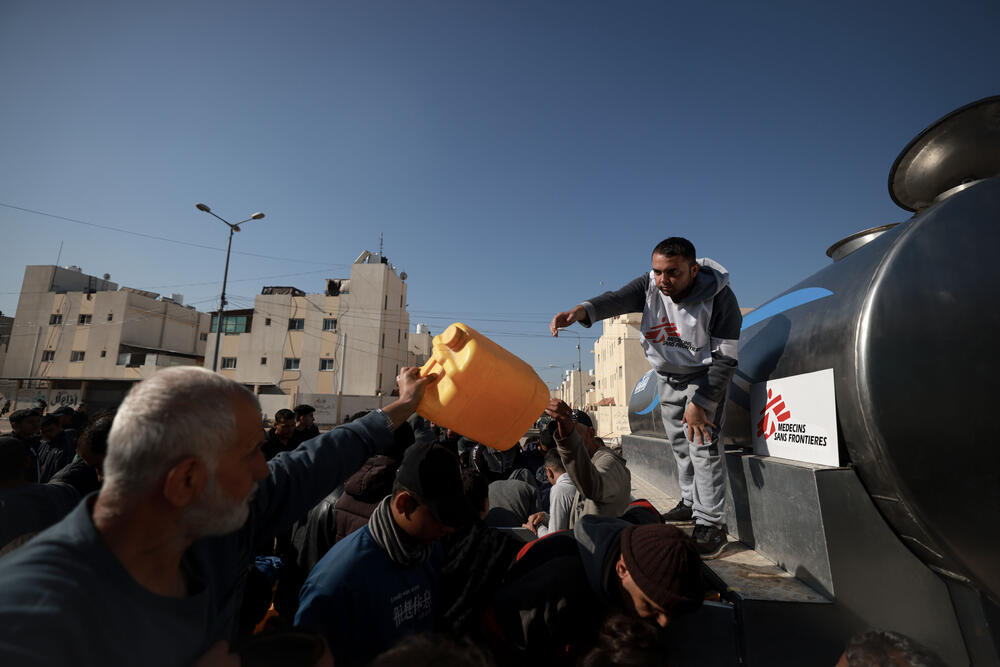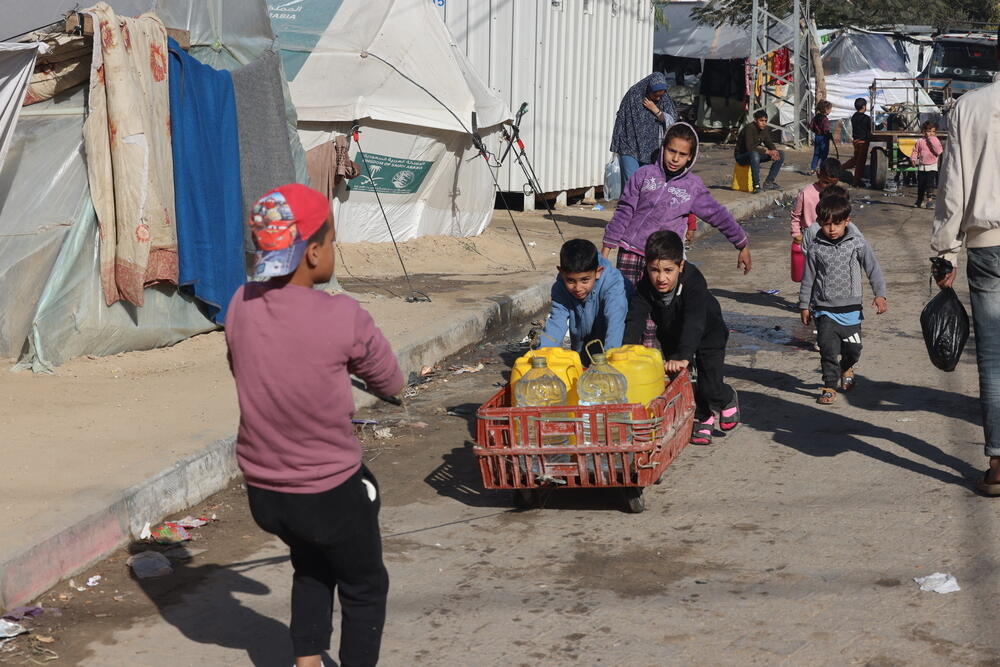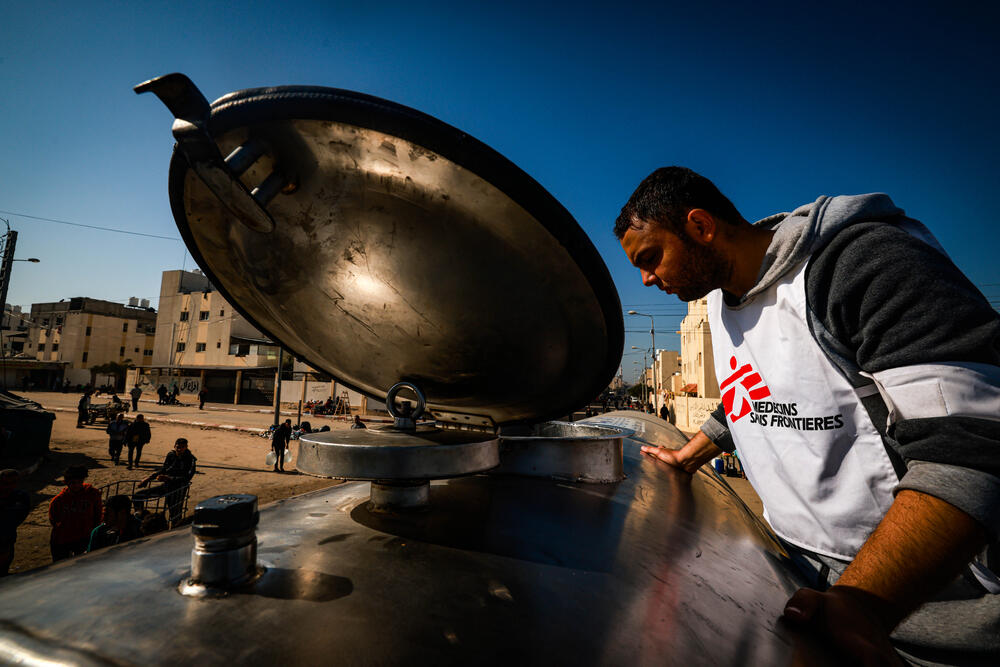Gaza: MSF teams working to deliver safe water as disease risk rises
The long line is visible from afar. Hundreds of people, of all ages, most of them holding distinctive yellow or blue jerrycans.
Some live in tents close to the water truck that has attracted the crowd to this exact spot in Rafah – a town in the south of the Gaza Strip, along the border with Egypt. Others, who live in shelters several miles away, have brought wheelchairs, hand trucks, shopping carts and even pushchairs to carry the vital water back.
One visually impaired man has come with his young daughter – the girl leading the way, her father carrying the water. They walked for over a mile to get here as there was no clean water in Al-Mawasi, the coastal area where they are currently living.
Since the war in Gaza began four months ago, little infrastructure has been spared by the near-incessant airstrikes that have struck the Strip. This includes water pipes.
According to UNICEF, at least half of the water and sanitation facilities in Gaza have been destroyed or damaged, while UNWRA reports that around 70 percent of the population is now drinking salinised or contaminated water.
Palestinians in Rafah – once a town of 300,000, but now hosting 1.5 million displaced people – struggle to find clean water for drinking, cooking or washing. There is overcrowding and a lack of toilets, showers and sewage systems for people caught in a situation that has only been aggravated by cold winter weather. In short, living conditions are desperate.
The disease risk
“We have noticed that, due to the lack of clean water for drinking or other uses, patients suffer from intestinal disorders and the flu virus, which is circulating widely,” says MSF health promotion manager Mohammad Abu Zayed.
“Lately, we’ve also witnessed children suffering from skin rashes due to the lack of clean water for bathing or washing.”
Other health risks include dehydration and hepatitis A.
"The lack of clean water can lead to many diseases related to the quality of the water, such as diarrhoea and skin diseases, but simply not having enough water can also lead to dehydration," says MSF medical advisor Marina Pomares.
Cooking is also affected, increasing the risk of infection.
"The effects are worse in children, who have weaker immune systems than adults, and are more exposed to diseases and allergies,” says Marina.

Help us prepare for the next emergency
MSF teams are providing basic healthcare in two locations in Rafah – the Shaboura Clinic and Al-Mawasi Health Post
As of 2 February, almost 30 percent of children under five seen by our teams here had diarrhoeal or skin diseases. In recent weeks, MSF teams in Rafah have also seen 43 patients with suspected hepatitis A.
These medical conditions are not only related to the shortage of clean water but are compounded by the lack of functioning medical facilities in the area.
110,000 litres
To respond to some of the most urgent needs of the displaced people in Rafah, MSF teams started a water distribution programme in December 2023.
Today, our water and sanitation teams are providing an average of 110,000 litres of safe drinking water per day to around 20,000 people. However, this is nowhere near enough to go around.
“In a normal situation, one person needs two to three litres of drinking water per day,” says MSF water and sanitation specialist Youssef Al-Khishawi.
“Now, with the current shortage, the average for one family of six is 3.8 litres.”
Hanin, who fled her home in Gaza City in the early days of the war due to shelling, is now sheltering in Rafah. Like most people in the town, she struggles to get hold of enough food, water and other essentials.
"We stand in lines to get water,” she says.
“If we get the chance to get some water, we will use it for washing and dish-washing, and if we can’t get any water, we will wait for the next day.”
MSF is ready to scale up the amount of water distributed, but other types of shortages stand in the way of the process, such as the limited number of trucks allowed into Gaza carrying aid and fuel.
“The main challenge we face in distributing water is the lack of fuel to pump and transport it,” says Youssef.
“The second is the lack of proper roads for our trucks to drive on because there are tents even on the asphalt.
“The third is that there are no water distribution points – even they have been bombed. Water pipes, streets and infrastructures are destroyed.”
MSF reiterates our call for a sustained ceasefire, which is the only way for people in Gaza to return to their homes. We also call for the flow of humanitarian aid into Gaza to be restored and scaled up to ensure people have access to essentials such as food, water and healthcare.
MSF and the Israel – Hamas conflict
An unprecedented humanitarian crisis is unfolding in Gaza. MSF teams have worked to treat the wounded and supply overwhelmed hospitals as indiscriminate airstrikes and a state of siege threaten millions of men, women and children.
Médecins Sans Frontières / Doctors Without Borders (MSF) is horrified by the events that began on Saturday 7 October – both the brutal mass killing of civilians perpetrated by Hamas in Israel, and by the massive attacks on Gaza now being pursued by the Israeli military.



